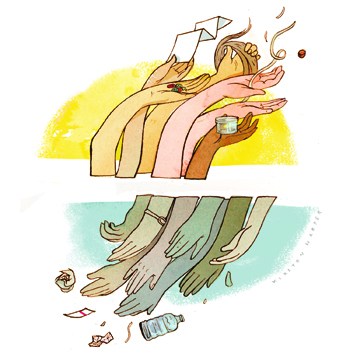 What we can take from those who make do
What we can take from those who make do
by Dee Dee Risher
I leave my friend by the library copy machine while I track down a book. I come back to find her carefully stuffing an inch-thick wad of white bond paper into her tiny bag. She turns to me incredulously. “Someone threw this away.”
After two months of visiting me in Philadelphia, she is still shocked by my country’s constant waste. In her homeland, China, wood is rare and precious. The fine, white paper goes home with us.
After two months of visiting me in Philadelphia, she is still shocked by my country’s constant waste. In her homeland, China, wood is rare and precious. The fine, white paper goes home with us.
The next morning, she is up early, industriously folding, cutting and shaping the paper into beautifully symmetrical envelopes. “I’m running out,” she explains.
I suppress a desire to tell her that I salvage at least six envelopes a day from junk mail, or that 30 envelopes cost one dollar at CVS. Instead, I loan her a glue stick.
That night, a pile of immaculate envelopes lays carefully stacked on her desk. “I didn’t use your glue,” she says, returning it. “It’s expensive. I used the starch from leftover breakfast noodles that stuck to the bottom of the pot. Otherwise they would have been wasted.”
The gulf between our experiences yawns as big as the 13,000 miles between our homelands.
Three-quarters of the world shares her understanding of make-do-ness. The necessity of conserving resources defines their days, and the ever-present threat of scarcity lurks on the horizon. Her very survival has hinged on her careful, minute habits of conservation that are now second nature. In China, her water and electricity were sometimes rationed. Taking out the weekly trash consisted of depositing one dustpan of refuse in the rubbish pile in the community courtyard. To bear daily witness to the ongoing, flagrant and unconscious habits of waste here in my culture must be torture. What kind of stretching must I do to understand the ways scarcity has shaped her? How can she possibly understand me?
Our possessions—what we have, what we share, and (most telling) what we are willing to live without—quietly define our relationships to one another in fundamental ways. Whether those relationships span our neighborhood, city or this chasm-ridden globe, our different positions in the consumption chain shape us.
Those of us in the world of the haves depend upon our easy computer access, cell phones and electricity. Turn off the switch and we don’t know what to do with ourselves. No need to go to work—there is no work to be done off the electric grid. Meanwhile, one-fifth of the world’s population lives without access to electricity.
Where we find ourselves in the great chain of consumption is largely an accident of birth. But the chain itself—with its impetus toward vast consumption of world resources by the lucky few and its huge wealth disparities—was created by humans. It can be altered. The question we now confront is this: Has our placement in that chain shaped us in ways that are irrevocable? Are we willing—or even able—to turn from easy consumptive patterns to which we have become habituated? Without such willingness to learn new ways, there is no authentic dream of sustainability.
Those of us who share this dream must start pursuing it right where we are, with as much creativity as we can muster. Any cultural redirection toward sustainability will not begin in governmental or business entities. It will be led by individuals who first made choices—inventively, purposefully and joyfully—that are costly in the logic of a throwaway society, but wise in the light of sustainability. More and more, I’m suspecting that if we take that goal seriously, we’ll all be learning a lot of new things from scratch. Like how to reorient our lives. Maybe even how to make envelopes.

